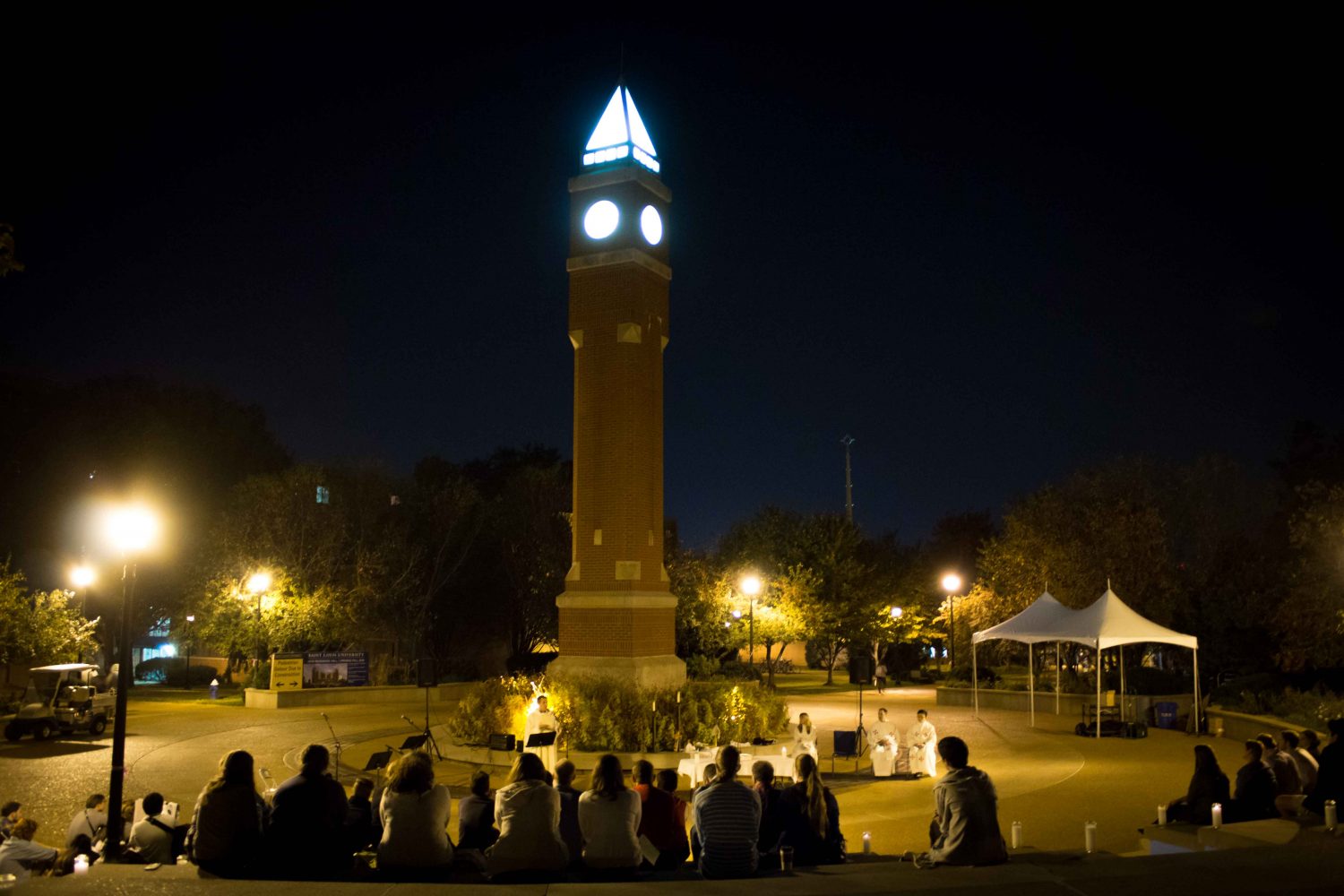On the evening of Monday, Oct. 12, one year to the day since hundreds of students had marched from Chaifetz Arena to the campus clock tower, nearly one hundred gathered in the same place to celebrate a “Mass for peace and justice.”
At 8:30 p.m., senior Abbie Amico, an intern with SLU’s Campus Ministry and the organizer of the Mass, addressed the congregation to express her hope for the ceremony to “invite a spirit of justice.” The songs she had chosen, she said, were meant to call attention to “the boundaries and borders we put on ourselves and others.”
Father Chris Collins, S.J., who only two weeks previously professed his final vows, incorporating him completely into the Society of Jesus, served as celebrant. In his opening remarks, he evoked the “radical inclusivity” preached by Christ and beseeched those present to invite “the questions and small answers God brings.”
Fr. Collins began his homily “recalling the turmoil and the unsettledness, and also the great gifts that came out of the experiences here in this very place a year ago.” The evening’s second reading, from the First Letter of St. Paul to the Romans, which recounts Paul’s transformative journey to Damascus, occupied the first portion of his discussion.
“[Paul] had a sense of certainty about who he was, about what his faith was and what his faith called him to do. And it’s the certainty that was shattered on the way to Damascus, when … the risen Jesus asks him, ‘Why are you persecuting me?’ That was the most unthinkable thing that Paul could have been confronted with.”
The future apostle, Collins explained, made it his mission to reveal to Rome, to the Jews and Gentiles alike, that “God has come much closer than we think. What we thought we knew God is and what God is like is not the case after all. It is, but there’s more to it.”
Collins shifted to what he saw as the obedience of faith, which involves “a kind of listening that requires conversion in us.”
“As Christians,” he said, “we are called to be unsettled, to allow ourselves to be unsettled, shaken up again and again by that word of God in our own lives, and also how that word of God is communicated to us through the condition of other people around us, and especially those who are suffering, those who are in great need, those who are isolated, those who are marginalized in all kinds of different ways. Those who are forgotten. It’s very easy, as we know, for us to be locked up into our own little bubbles, whatever those bubbles might be. We could be locked into ideological bubbles; we could be locked into socioeconomic bubbles. Whatever those are, those bubbles are not good. They’re not going to last. Sooner or later those bubbles burst.”
Transitioning to the Gospel reading, he addressed Jesus’ shocking categorization of a sign-seeking generation as evil. “I think that what maybe he’s got in mind there is that we want signs that are out there that can confirm me, that I’m on the right path. … [that] allow myself to be convinced that I am doing things just right, and the problem is out there with all those other people, whoever those other people are.”
Collins spoke of Jonah, sent against his will by God to call for repentance and conversion “in the place of Nineveh that had grown deeply corrupt.” “And for some reason,” said Collins, “those people of Nineveh responded. Something pierced their own hearts and their own consciences.”
“Jesus said that’s the only sign you need … the sign that leads to conversion, the sign that leads to radical humility on our parts, so that God can bring about something new.”
Collins stepped back from his interpretation to appeal to his listeners. “The hard thing is, this conversion is constant. We are constantly called to this conversion. We are constantly called to be unsettled.”
Around the site of the Mass, students walked endlessly back and forth. You could hear the metallic tap of counterweights on flagpoles as the wind blew. As Fr. Collins reached his conclusion, sirens of some kind blared from far off. Traffic whispered persistently.
“Maybe that’s part of what we might allow ourselves to be drawn into this evening, is a willingness to be unsettled by the word of God in our lives, a willingness to be unsettled by the needs and the plight of other people, the suffering of other people, and to be moved. To be moved out of ourselves and into real solidarity, into places of real friendship, into places of real dialogue that begin always not with us speaking, but first with us listening.”






